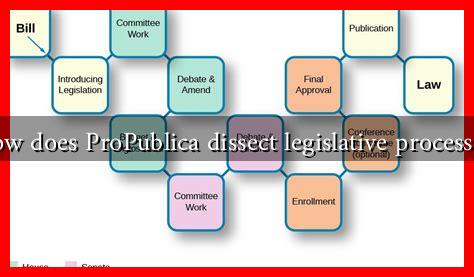-
Table of Contents
How Does ProPublica Dissect Legislative Processes?
ProPublica, a nonprofit investigative journalism organization, has gained a reputation for its in-depth analysis of legislative processes in the United States. By employing a combination of data journalism, investigative reporting, and public engagement, ProPublica sheds light on the often opaque workings of government. This article explores how ProPublica dissects legislative processes, the methodologies it employs, and the impact of its findings on public understanding and policy reform.
The Role of Data Journalism
One of the key tools in ProPublica’s arsenal is data journalism. By analyzing large datasets, ProPublica can uncover trends and patterns that might otherwise go unnoticed. This approach allows them to provide context and depth to legislative issues.
. Some of the ways ProPublica utilizes data journalism include:
- Tracking Legislation: ProPublica maintains a comprehensive database of bills introduced in Congress, allowing them to track the progress of legislation over time.
- Analyzing Voting Records: By examining how legislators vote on various issues, ProPublica can highlight partisan divides and identify trends in legislative behavior.
- Mapping Lobbying Influence: ProPublica investigates the financial contributions of lobbyists and special interest groups, revealing how money influences legislative outcomes.
For instance, ProPublica’s analysis of the 2017 tax reform bill revealed that a significant portion of the legislation favored wealthy individuals and corporations, raising questions about the motivations behind the bill’s support. This kind of data-driven reporting not only informs the public but also holds lawmakers accountable.
Investigative Reporting Techniques
In addition to data journalism, ProPublica employs traditional investigative reporting techniques to dissect legislative processes. This includes:
- Interviews with Key Stakeholders: ProPublica journalists often conduct interviews with lawmakers, lobbyists, and advocacy groups to gain insights into the motivations and implications of specific legislation.
- Public Records Requests: By filing Freedom of Information Act (FOIA) requests, ProPublica can access government documents that reveal the behind-the-scenes discussions and negotiations that shape legislation.
- Case Studies: ProPublica frequently highlights specific case studies that illustrate broader legislative trends, providing readers with relatable examples of how laws impact everyday lives.
For example, ProPublica’s investigation into the Affordable Care Act (ACA) included interviews with healthcare professionals and patients, revealing the real-world implications of legislative decisions on healthcare access and affordability.
Engaging the Public and Fostering Transparency
ProPublica’s commitment to transparency extends beyond its reporting. The organization actively engages the public through various initiatives:
- Interactive Tools: ProPublica creates interactive tools that allow users to explore legislative data, such as the Represent platform, which helps users understand who their representatives are and how they vote.
- Public Feedback: ProPublica encourages readers to share their experiences and insights related to legislative issues, fostering a two-way dialogue between journalists and the public.
- Educational Resources: The organization provides resources for educators and students to understand the legislative process, promoting civic engagement and informed citizenship.
By making legislative processes more accessible, ProPublica empowers citizens to engage with their government and advocate for change.
Impact on Policy Reform
The impact of ProPublica’s work on policy reform cannot be overstated. By exposing corruption, highlighting inequities, and providing data-driven insights, ProPublica has played a crucial role in shaping public discourse around key legislative issues. Some notable outcomes include:
- Increased Accountability: ProPublica’s investigations have led to greater scrutiny of lawmakers and their decisions, prompting calls for accountability and reform.
- Informed Public Debate: By providing comprehensive analyses of complex issues, ProPublica has enriched public debate, allowing citizens to make informed decisions about their representatives and policies.
- Policy Changes: In some cases, ProPublica’s reporting has directly influenced legislative changes, as lawmakers respond to public outcry generated by their investigations.
Conclusion
ProPublica’s dissection of legislative processes exemplifies the power of investigative journalism in promoting transparency and accountability in government. Through data journalism, traditional investigative techniques, and public engagement, ProPublica not only informs the public but also fosters a more informed citizenry capable of advocating for meaningful change. As the landscape of journalism continues to evolve, ProPublica remains a vital resource for understanding the complexities of legislative processes and their implications for society.





